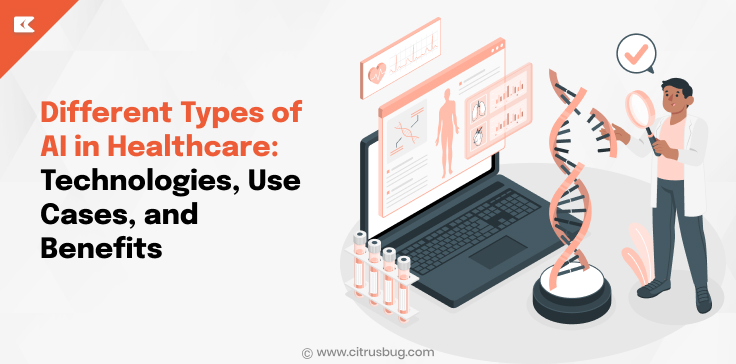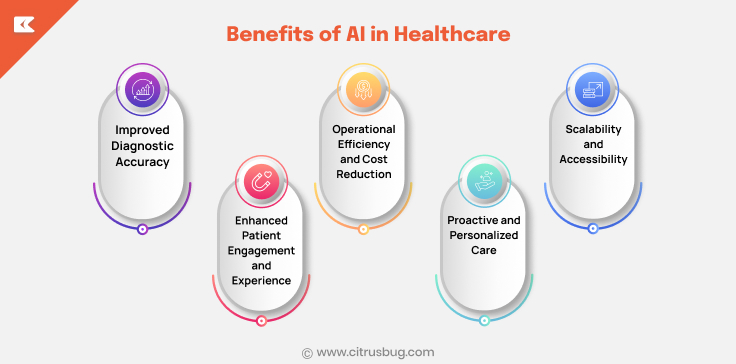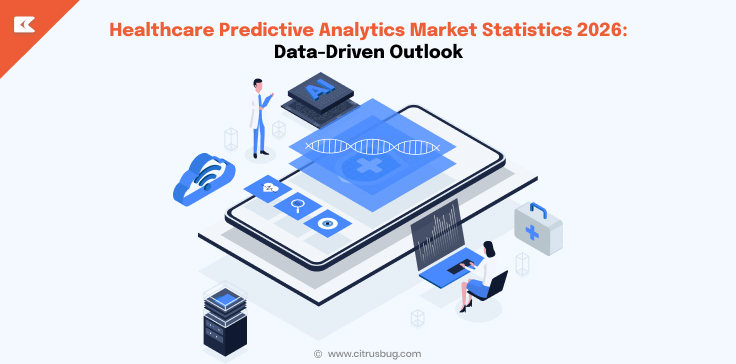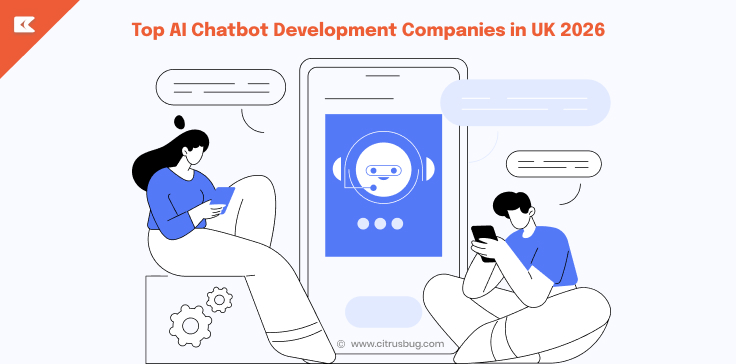Different Types of AI in Healthcare: Technologies, Use Cases & Benefits
- May 30, 2025
-
2359 Views
- by Ishan Vyas

Artificial Intelligence (AI) is rapidly changing how healthcare is delivered and managed. From enhancing diagnostic accuracy to automating time-consuming administrative tasks, AI technologies are increasingly being woven into the fabric of clinical and operational workflows.
But not all AI in healthcare looks the same. Different types of AI algorithms & technologies, such as machine learning, natural language processing, and computer vision, are suited to different challenges, whether it’s interpreting medical images, predicting patient outcomes, or extracting insights from unstructured clinical data.
Whether you’re building tech-enabled solutions or simply staying informed, this overview will help you understand how AI is shaping the future of healthcare and where it’s heading next.
What is AI in Healthcare?
Artificial Intelligence in healthcare refers to the use of complex algorithms and software to emulate human cognition in the analysis, interpretation, and understanding of medical and healthcare data. It encompasses a range of technologies, including machine learning (ML), natural language processing (NLP), computer vision, and robotics, each designed to tackle specific challenges in clinical care and operations.
At its core, AI in healthcare is about leveraging data both structured (like lab results and EHRs) and unstructured (such as physician notes or imaging files), to uncover patterns, predict outcomes, and support decision-making. For instance, machine learning models can analyze years of patient records to predict the likelihood of disease progression, while NLP tools can extract meaningful insights from volumes of unstructured clinical text.
These capabilities are already being implemented across a range of healthcare software systems, powering everything from AI-driven healthcare chatbot development for patient engagement to real-time decision support tools in emergency departments. Many modern healthcare app development projects now include AI features by default, recognising the value they bring in improving care coordination and user experience.
What sets AI apart is its ability to learn and improve from new data continuously. Unlike traditional rule-based systems, AI adapts, making it especially useful in fast-changing environments like hospitals and research labs. As the technology continues to evolve, so too does its potential to address critical healthcare challenges from early disease detection to personalized treatment planning.
Types of AI Technologies in Healthcare
Artificial Intelligence isn’t a single technology, it’s a collection of different approaches and tools, each with distinct applications in the healthcare industry. Here’s a breakdown of the most widely used types of AI technologies transforming healthcare today:
Machine Learning in Healthcare
Machine Learning is the backbone of many AI applications in healthcare. It enables systems to learn from historical data and make predictions or decisions without being explicitly programmed.
Use Cases:
- Predictive analytics for identifying at-risk patients (e.g., readmission risk)
- Personalised treatment plans based on patient history
- Early diagnosis of diseases such as diabetes or cancer
For example, ML models have been used to detect breast cancer with higher accuracy than traditional methods, especially when trained on large datasets. According to the National Library of Medicine (NIH), AI outperformed human radiologists in identifying breast tumors in mammograms.
Deep Learning in Healthcare
A subset of machine learning, deep learning involves neural networks with many layers, allowing systems to process complex, high-dimensional data, especially useful in image and pattern recognition.
Use Cases:
- Radiology and pathology image analysis
- Detection of skin lesions or retinal diseases
- Voice-assisted diagnostic tools
Deep learning has fueled major progress in diagnostic imaging, reducing the time required to interpret MRI or CT scans and helping clinicians make faster decisions.
Natural Language Processing (NLP)
NLP allows AI systems to understand, interpret, and generate human language. In healthcare, it’s essential to extract meaningful data from clinical documents and facilitate better communication between systems and providers.
Use Cases:
- Automated transcription of doctor-patient conversations
- Interpretation of EHRs
- Clinical documentation improvement
By applying NLP, healthcare providers can significantly reduce time spent on manual data entry and documentation. These capabilities also support applications such as AI-based clinical chatbots, medical voice assistants, and tools for identifying patient sentiment, all of which are gaining traction in real-world NLP-driven healthcare solutions today.
AI Chatbots and Virtual Assistants
AI chatbots and virtual health assistants provide real-time patient engagement, helping with appointment scheduling, medication reminders, symptom checking, and answering FAQs.
These conversational agents improve access to healthcare services and reduce administrative burdens. Learn more about their impact in our article on AI chatbots in healthcare.
AI-Powered Automation in Healthcare Operations
While much of the attention in AI centers on diagnostics and treatment, a significant portion of its impact lies in automating healthcare’s behind-the-scenes operations. From scheduling to revenue cycle management, AI-driven tools are streamlining tasks that previously consumed hours of administrative effort.
Use Cases:
- Patient intake and appointment scheduling through AI-enabled systems
- Claims processing and billing automation using intelligent rule-based engines
- Workflow orchestration across departments to reduce bottlenecks
- AI chatbots for 24/7 patient interaction, appointment reminders, and FAQs
Many healthcare AI development services now focus on improving operational efficiency to help providers reduce costs and focus more on delivering care. For instance, integrating AI chatbots into healthcare apps enables round-the-clock patient engagement and helps reduce the load on support staff, a capability that’s becoming increasingly valuable in high-volume clinics and telehealth platforms.
Predictive Analytics in Clinical Decision Support
Predictive analytics uses AI algorithms to analyze historical and real-time data to forecast future health outcomes. It’s a growing area of interest among care providers aiming to shift from reactive to proactive care.
Use Cases:
- Early risk detection for chronic conditions like heart disease or diabetes
- Readmission prediction models to optimize discharge planning
- Patient deterioration alerts in ICUs and emergency departments
- Resource demand forecasting for hospital beds or staffing
Predictive systems can help clinicians prioritize cases, reduce adverse events, and allocate resources more effectively. As healthcare organizations continue to embrace data-driven strategies, predictive modelling is becoming a standard feature in modern healthcare software development projects.
Real-World Use Cases of AI in Healthcare
AI in healthcare is no longer experimental, it’s already delivering measurable impact across clinical, operational, and patient-facing functions. Below are some of the most compelling real-world use cases that highlight how different AI technologies are improving healthcare outcomes and workflows.
Early Disease Detection and Diagnosis
AI algorithms are increasingly used to detect diseases earlier and more accurately than traditional methods. For example, machine learning models can analyze EHR data, imaging, and lab results to flag patients at high risk for chronic conditions like diabetes, heart disease, or cancer.
In radiology, computer vision systems can detect anomalies in CT scans or MRIs that might otherwise be overlooked. AI-assisted diagnostics not only improve accuracy but also speed up time-to-diagnosis, crucial in time-sensitive cases like stroke or sepsis.
Personalized Treatment Plans
AI enables a shift from generic care protocols to highly personalized treatment strategies. By analyzing a patient’s history, genetic data, and real-time vitals, AI tools can recommend individualized therapies or medication plans.
Such personalized approaches are particularly useful in oncology, where AI can match patients with the most effective treatment based on tumor characteristics and genetic profiles.
Virtual Assistants for Patient Engagement
Chatbots and virtual health assistants are becoming an essential part of digital health strategies. These tools help patients book appointments, receive medication reminders, understand post-discharge care instructions, or access basic health information—all without human intervention.
Clinical Documentation and Workflow Automation
Clinical documentation is one of the most time-consuming tasks for providers. AI-powered tools that use NLP can automate transcription, extract key information from physician notes, and assist in generating accurate, coded documentation for billing and compliance.
These capabilities free up clinicians to focus more on patient care while reducing errors and administrative overhead.
Remote Monitoring and Chronic Disease Management
AI is playing a major role in remote healthcare delivery, especially for patients with chronic conditions. Smart devices and mobile apps collect real-time health data (e.g., blood glucose levels, heart rate), which AI systems monitor for patterns or anomalies.
If something appears concerning, alerts can be sent to both patients and care teams for timely intervention. Many of these features are now integral to remote patient management (RPM) software development services, improving long-term outcomes and enabling proactive care.
Operational Optimization
Beyond clinical use, AI also supports administrative efficiency. Predictive models can forecast patient volumes to improve staffing, while intelligent scheduling systems minimize appointment gaps. AI also supports revenue cycle management by reducing claim denials through pre-submission validation and documentation review.
According to the binariks statistics, AI-driven automation could save the U.S. healthcare system up to $360 billion annually by improving operational workflows and administrative functions.
Benefits of AI in Healthcare
Artificial Intelligence is driving transformative benefits across healthcare from improving clinical outcomes to optimizing operational efficiency. Understanding these advantages clarifies why healthcare organizations are increasingly adopting AI technologies.
Improved Diagnostic Accuracy
AI-powered tools, especially those using machine learning and computer vision, can analyze complex datasets faster and with fewer errors than humans alone. This leads to earlier and more accurate diagnosis, which is critical for conditions like cancer, cardiovascular diseases, and neurological disorders.
Improved diagnostic accuracy helps reduce misdiagnoses, unnecessary treatments, and associated costs, ultimately leading to better patient outcomes.
Enhanced Patient Engagement and Experience
AI technologies such as virtual health assistants and chatbots provide patients with 24/7 access to healthcare information and support. This accessibility helps improve adherence to treatment plans, medication schedules, and follow-up appointments.
By integrating AI-driven conversational agents into patient engagement software solutions, healthcare providers can offer personalized communication, which improves patient satisfaction and loyalty.
Operational Efficiency and Cost Reduction
AI automation in scheduling, claims processing, dispensary management, and clinical documentation streamlines workflows, reduces administrative burdens, and minimizes human error. This leads to significant time and cost savings for healthcare providers.
According to a report by Deloitte , AI adoption can reduce operational costs by up to 30%, making healthcare more affordable and sustainable.
Proactive and Personalized Care
Predictive analytics and machine learning enable healthcare providers to anticipate patient risks and intervene early. Personalized treatment plans based on AI analysis help tailor care to individual patient needs, improving effectiveness and reducing adverse events.
This proactive approach shifts healthcare from reactive treatment to prevention and wellness management.
Scalability and Accessibility
AI-driven tools can be deployed across various care settings, from large hospitals to remote clinics and telehealth platforms, making quality healthcare accessible to underserved populations.
AI-powered mobile apps and virtual assistants bridge geographical and resource gaps, enhancing healthcare equity.
Challenges and Considerations in AI Healthcare Implementation
While AI holds immense promise in healthcare, its implementation comes with several challenges and considerations that providers and developers must address to ensure success and safety.
Data Privacy and Security
Healthcare data is highly sensitive and protected under regulations like HIPAA (Health Insurance Portability and Accountability Act) in the U.S. Implementing AI requires handling large volumes of patient data, which raises concerns about data privacy, consent, and cybersecurity.
Developers must design AI systems with robust encryption, anonymization techniques, and strict access controls to protect patient information from breaches or misuse.
Data Quality and Integration
AI models rely heavily on the quality and completeness of data. Inconsistent, incomplete, or biased data can lead to inaccurate predictions or decisions. Additionally, healthcare data often resides in disparate systems such as EHRs, imaging archives, and lab databases, which can be challenging to integrate effectively.
Successful AI deployment depends on clean, standardized, and interoperable data to train algorithms and provide reliable outputs.
Regulatory Compliance and Ethical Concerns
AI in healthcare is subject to stringent regulatory scrutiny. Algorithms used for diagnosis or treatment recommendations must often undergo approval processes from agencies like the FDA.
Ethical concerns also arise around algorithmic bias, transparency, and accountability, ensuring AI decisions are explainable and do not reinforce disparities in care.
Adoption and Change Management
Introducing AI technologies requires shifts in workflows, staff training, and trust-building. Healthcare professionals may be hesitant to rely on AI without understanding how it works or fearing job displacement.
Effective adoption involves clear communication, demonstrating AI’s role as an assistive tool, and involving end-users early in the development process.
Cost and Infrastructure
Developing, integrating, and maintaining AI systems requires significant investment in infrastructure, software, and skilled personnel. Smaller healthcare providers may face barriers due to limited resources or lack of in-house AI expertise.
Cloud-based solutions and partnerships with experienced healthcare software developers can help mitigate these challenges.
Despite these hurdles, with thoughtful planning and collaboration, the benefits of AI in healthcare can far outweigh the risks. Understanding and addressing these considerations is key to building trustworthy, effective AI systems that improve patient care.
Conclusion: How Citrusbug Supports AI Innovations in Healthcare
Artificial Intelligence is transforming healthcare by enhancing diagnostics, personalizing treatments, automating operations, and improving patient engagement. While challenges remain, the potential benefits for providers and patients alike make AI an essential component of modern healthcare strategies.
At Citrusbug, we understand the complexities of integrating AI technologies into healthcare environments. Our expertise spans developing custom AI-powered healthcare applications, implementing advanced NLP solutions, creating intelligent chatbots, and building predictive analytics tools tailored to clinical and operational needs.
By partnering with healthcare organizations, we help design and deliver solutions that improve workflows, reduce costs, and elevate patient care quality. Our approach emphasizes data security, regulatory compliance, and user-centered design, ensuring that AI innovations are both effective and trustworthy.
Whether you’re looking to develop a new AI-driven mobile app or integrate intelligent automation into existing systems, Citrusbug is a dedicated healthcare software development agency equipped to support your journey toward digital transformation.





 SaaS Development
SaaS Development Web Application Development
Web Application Development Mobile Application Development
Mobile Application Development Custom Software Development
Custom Software Development Cloud Development
Cloud Development DevOps Development
DevOps Development MVP Development
MVP Development Digital Product Development
Digital Product Development Hire Chatbot Developers
Hire Chatbot Developers Hire Python Developers
Hire Python Developers Hire Django Developers
Hire Django Developers Hire ReactJS Developers
Hire ReactJS Developers Hire AngularJS Developers
Hire AngularJS Developers Hire VueJS Developers
Hire VueJS Developers Hire Full Stack Developers
Hire Full Stack Developers Hire Back End Developers
Hire Back End Developers Hire Front End Developers
Hire Front End Developers AI Healthcare Software Development & Consulting
AI Healthcare Software Development & Consulting Healthcare App Development
Healthcare App Development EHR Software Development
EHR Software Development Healthcare AI Chatbot Development
Healthcare AI Chatbot Development Telemedicine App Development Company
Telemedicine App Development Company Medical Billing Software Development
Medical Billing Software Development Fitness App Development
Fitness App Development RPM Software Development
RPM Software Development Medicine Delivery App Development
Medicine Delivery App Development Medical Device Software Development
Medical Device Software Development Patient Engagement Software Solutions
Patient Engagement Software Solutions Mental Health App Development
Mental Health App Development Healthcare IT Consulting
Healthcare IT Consulting Healthcare CRM Software Development
Healthcare CRM Software Development Healthcare IT Managed Services
Healthcare IT Managed Services Healthcare Software Testing services
Healthcare Software Testing services Medical Practice Management Software
Medical Practice Management Software Outsourcing Healthcare IT Services
Outsourcing Healthcare IT Services IoT Solutions for Healthcare
IoT Solutions for Healthcare Medical Image Analysis Software Development Services
Medical Image Analysis Software Development Services Lending Software Development Services
Lending Software Development Services Payment Gateway Software Development
Payment Gateway Software Development Accounting Software Development
Accounting Software Development AI-Driven Banking App Development
AI-Driven Banking App Development Insurance Software Development
Insurance Software Development Finance Software Development
Finance Software Development Loan Management Software Development
Loan Management Software Development Decentralized Finance Development Services
Decentralized Finance Development Services eWallet App Development
eWallet App Development Payment App Development
Payment App Development Money Transfer App Development
Money Transfer App Development Mortgage Software Development
Mortgage Software Development Insurance Fraud Detection Software Development
Insurance Fraud Detection Software Development Wealth Management Software Development
Wealth Management Software Development Cryptocurrency Exchange Platform Development
Cryptocurrency Exchange Platform Development Neobank App Development
Neobank App Development Stock Trading App Development
Stock Trading App Development AML software Development
AML software Development Web3 Wallet Development
Web3 Wallet Development Robo-Advisor App Development
Robo-Advisor App Development Supply Chain Management Software Development
Supply Chain Management Software Development Fleet Management Software Development
Fleet Management Software Development Warehouse Management Software Development
Warehouse Management Software Development LMS Development
LMS Development Education App Development
Education App Development Inventory Management Software Development
Inventory Management Software Development Property Management Software Development
Property Management Software Development Real Estate CRM Software Development
Real Estate CRM Software Development Real Estate Document Management Software
Real Estate Document Management Software Construction App Development
Construction App Development Construction ERP Software Development
Construction ERP Software Development









